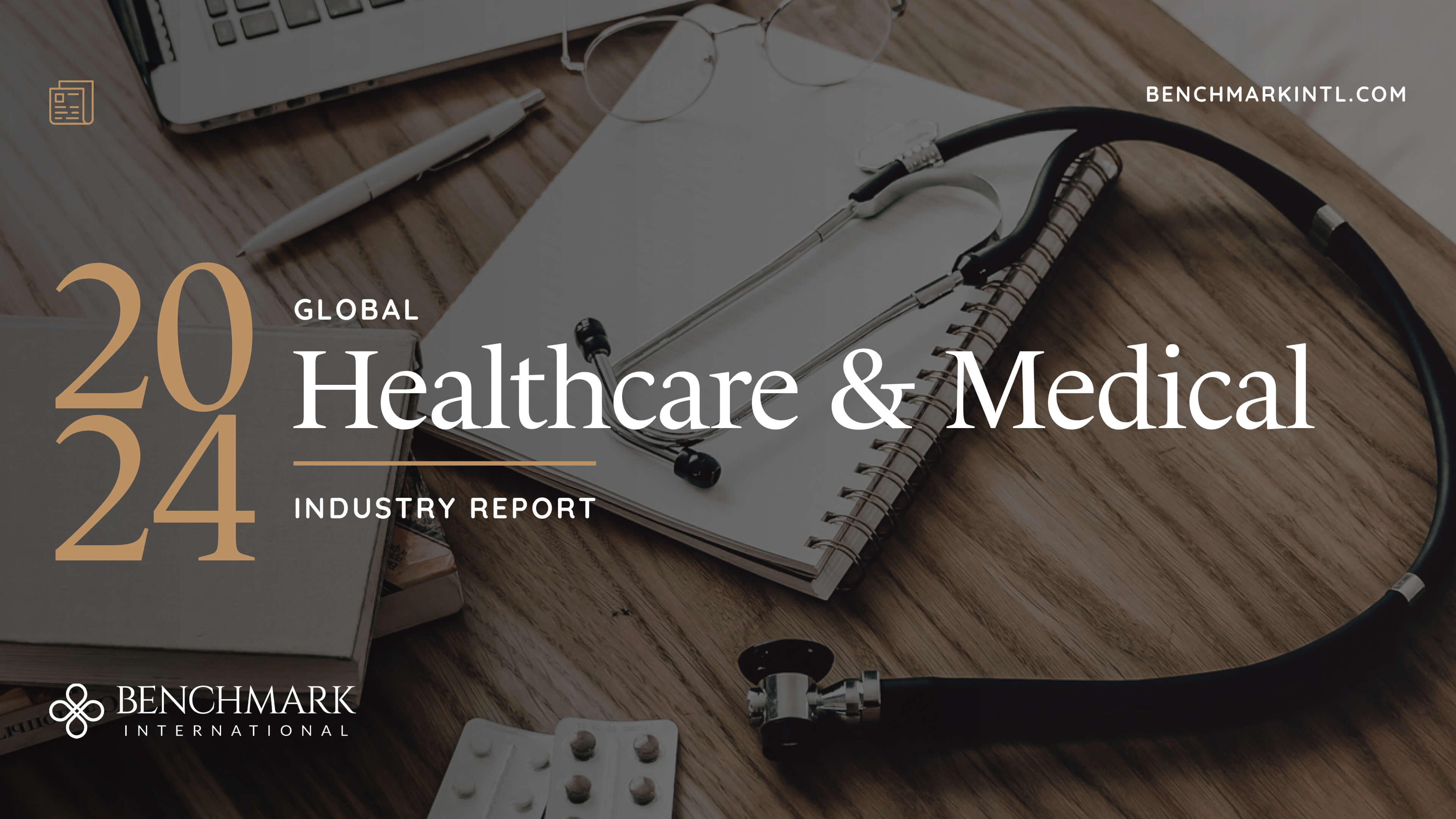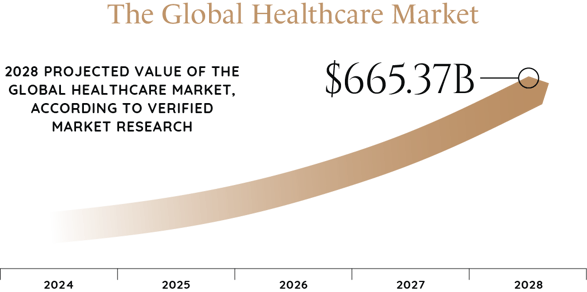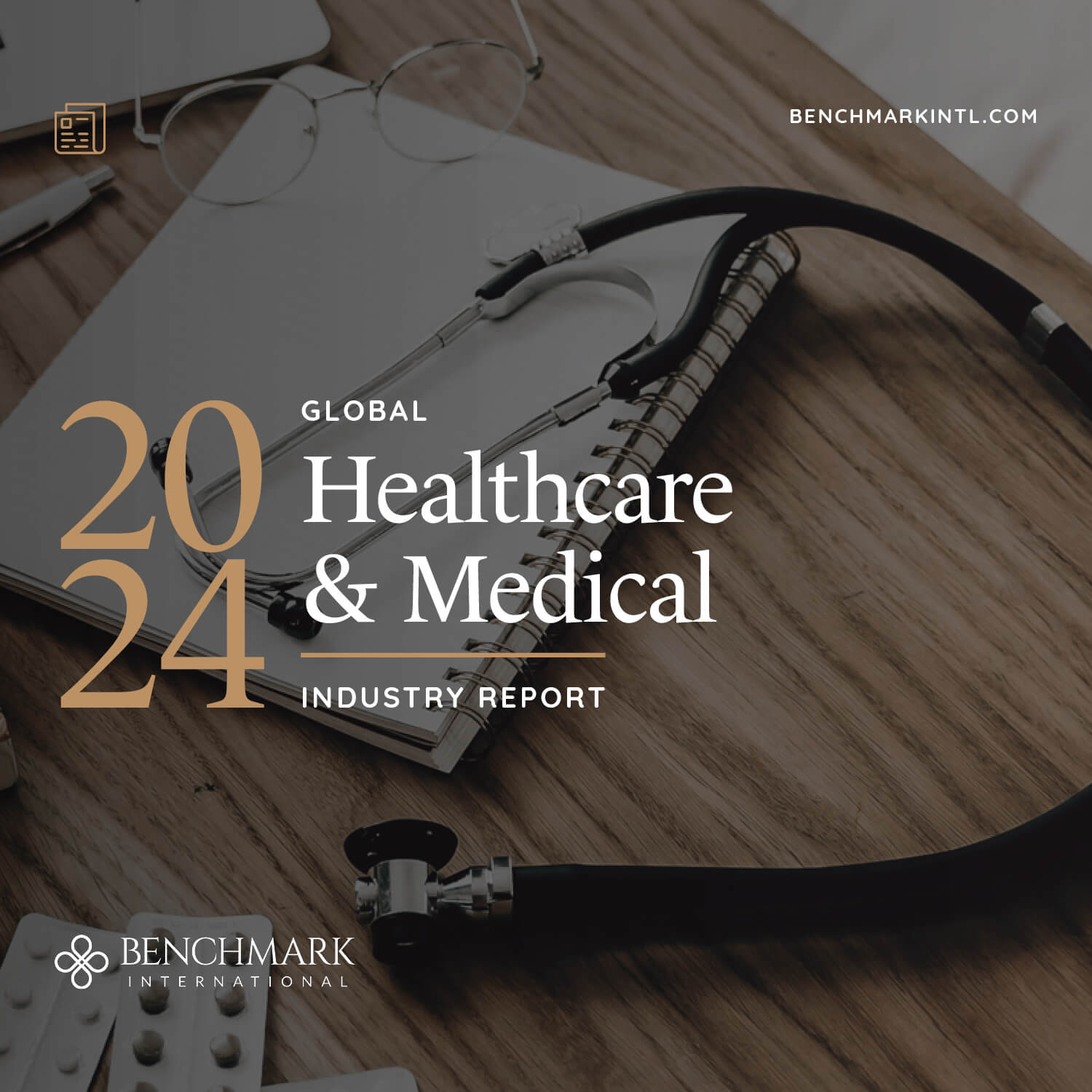
According to Verified Market Research, the global healthcare market will reach $665.37 billion by 2028. The healthcare sector is primarily segmented into pharmaceuticals, services, devices, and others. By application, the industry is categorized by cardiovascular, oncology, anti-infection, central nervous system, respiratory, and others.

The United States is the world's largest healthcare market, but with consolidation and exposure to government payers, healthcare markets in other regions are expected to grow faster. In 2021, U.S. healthcare spending was $4.3 trillion (about $12,900 per person). The average cost of healthcare per person in other high-GDP countries is roughly half that.

Industry Trends
The COVID-19 pandemic permanently altered the healthcare industry around the world. It accelerated the adoption of new technologies and care-delivery models. More patients are open to using virtual health services (or telehealth or telemedicine), pushing many organizations to improve and advance their virtual service offerings.
Digital health technologies are redefining the future of healthcare and health delivery. More digital health technologies are being used in clinical processes, such as cloud computing, machine learning, artificial intelligence, telehealth, blockchain, wearable devices, and ingestibles. These technologies offer real-time and continuous data about patient health. There is also an increasing focus on cybersecurity to protect sensitive patient data in this new era.
These technologies can also significantly reduce care costs. They also offer a solution to the shortage of critical care physicians. Additionally, electronic health records (EHR) provide a more comprehensive picture of population and individual health. The widespread adoption of EHR forces large providers to migrate their services to the cloud and form partnerships with customer relationship management (CRM) and enterprise resource planning (ERP) providers.
During the pandemic, mental health services came to the forefront of virtual health. Today, many mobile users use these services. More apps are becoming available to help patients manage mental health conditions such as anxiety or depression.
Another major trend in the sector is an increasing focus on sustainability and resilience. Climate change poses a threat to health and well-being worldwide. As these risks increase, providers must find ways to balance quality of care with financial pressure. Dealing with climate-related threats requires health systems to be more resilient and sustainable to provide care in natural disasters, have ample supplies, and adopt practices that reduce waste and emissions. Recycling and waste management programs are being implemented to aid in sustainability efforts. Using local suppliers also helps reduce emissions footprints and minimize supply disruptions. Virtual healthcare also aids sustainability efforts, as patients cannot rely on transportation to meet with their physicians and can do so on their computers or smartphones.
Another issue gaining more traction in the healthcare ecosystem is health inequity. Across the global healthcare system, social, economic, and environmental circumstances determine the quality of the population's health. There are disparities based on age, location, gender, income, race, ethnicity, religion, and sexual orientation. The pandemic further underscored the problem, as the virus disproportionately impacted the most vulnerable. As a result, organizations emphasize addressing health inequities, such as life expectancy, food access, childcare, stable housing, and income.
M&A
There is expected to be an increase in M&A in health and healthcare technology in 2024, as the COVID-19 pandemic brought the importance of health technology and healthcare delivery systems to the forefront.
Biopharma M&A saw quite a rebound in 2023, with an aggregate deal value up by 79% versus 2022, to reach around $152 billion for the year, the highest since 2019. Average deal size also maintained an upward trend towards levels not seen since 2020. In addition to solid fundamentals, there are positive catalysts to further support deal momentum in 2024, including new threats to growth, the fear of missing out, and a renaissance of high prevalence conditions.

The healthcare IT sector is highly fragmented, with many small and mid-sized businesses looking to maintain independence while they grow. More healthcare players are moving to the cloud and pursuing other digital advances, likely resulting in more healthcare IT deals.
Many hospitals and health systems are pursuing M&A and partnerships to gain scale and share resources. Over 60% of survey respondents expect deal volume to increase in 2024. Health systems will pursue partnerships to grow share (especially with digital health companies and physicians), build new revenue streams, and gain economies of scale.

Innovations in cardiology, robotic surgery, and Internet-connected wearables may also spark dealmaking in 2024 for medical devices. Innovation across robotics, AI, machine learning, and IoT are driving advancements, and 2024 is expected to see a range of deals focused on these areas.
Private equity firms are shifting their investment strategies to adapt to macroeconomic circumstances. Funds are finding more creative ways to get deals done, such as smaller deals, public-to-private partnerships, carve-outs and spin-offs, tuck-in acquisitions, corporate partnerships, platform buy-and-build, and minority recapitalizations. They also focus more on companies likely to remain strong in imperfect markets.
The fundamentals of healthcare M&A forecast to remain strong. Between large cash balances (the top 25 pharma, medtech, and payer companies all have at least 15% of their past year's revenue in cash) and the growth potential of M&A, corporate solid deal activity is expected to increase. This is especially true for the pharmaceutical sector. The top 15 drugs going off patent by 2030 generated over $100 billion in revenue in 2020.


There is also increasing cross-sector competition, leading to more strategic dealmaking and shifting focus to create synergies. As newly independent medtech companies turn to M&A to drive growth, portfolio realignment could present more exit opportunities. Partnerships between corporate acquirers and private equity sponsors are becoming more common and offer benefits for both parties, as they have access to capital and a possible path to exit.
On the side of healthcare delivery, financials are expected to stay upbeat as M&A, transformation strategies, and revenue diversification get results. Growth will continue in healthcare services and technology (HST) businesses due to the increasing technology adoption. This is particularly true for companies offering fast and measurable customer improvements. Pharmacy services will also see continued growth, especially among companies focusing on specialty pharmacy.
Americas: Sam Smoot at +1 (813) 898 2350 / Smoot@BenchmarkIntl.com
Europe: Michael Lawrie at +44 (0) 161 359 4400 / Lawrie@BenchmarkIntl.com
Africa: Anthony McCardle at +27 21 300 2055 / McCardle@BenchmarkIntl.com
ABOUT BENCHMARK INTERNATIONAL:
Benchmark International is a global M&A firm that provides business owners with creative, value-maximizing solutions for growing and exiting their businesses. Benchmark International has handled over $11 billion in transaction value across various industries from offices across the world. With decades of M&A experience, Benchmark International’s transaction teams have assisted business owners with achieving their objectives and ensuring the continued growth of their businesses. The firm has also been named the Investment Banking Firm of the Year by The M&A Advisor and the Global M&A Network as well as the #1 Sell-side Exclusive M&A Advisor in the World by Pitchbook’s Global League Tables.
Website: http://www.benchmarkintl.com
Blog: http://blog.benchmarkcorporate.com

 Benchmark International
Benchmark International  Benchmark International
Benchmark International 




